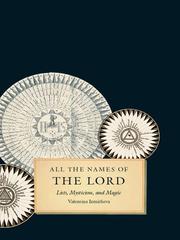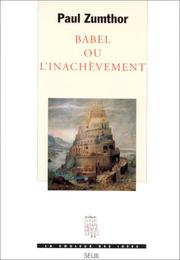| Listing 1 - 7 of 7 |
Sort by
|
Book
ISBN: 9021139405 Year: 2004 Publisher: Zoetermeer Meinema
Abstract | Keywords | Export | Availability | Bookmark
 Loading...
Loading...Choose an application
- Reference Manager
- EndNote
- RefWorks (Direct export to RefWorks)
Babel, Tower of --- #GGSB: Exegese O.T --- #GGSB: Pentateuch --- #GGSB: Tekstkritiek O.T --- Tower of Babel --- Confusion of tongues --- Ziggurats --- Bible --- Exegese O.T --- Pentateuch --- Tekstkritiek O.T
Book
ISBN: 9783035625028 Year: 2022 Publisher: Boston, Massachusetts : De Gruyter,
Abstract | Keywords | Export | Availability | Bookmark
 Loading...
Loading...Choose an application
- Reference Manager
- EndNote
- RefWorks (Direct export to RefWorks)
Architecture after God A vivid retelling of the biblical story of Babel leads from the contested site of Babylon to the soaring towers of the modern metropolis, and sets the bright hopes of early modernism against the shadows of gathering war. Dealing in structural metaphor, utopian aspiration, and geopolitical ambition, Dugdale exposes the inexorable architectural implications of the event described by Nietzsche as the death of God. The Exploring Architecture series makes architectural scholarship accessible, introduces the latest research methods, and covers a wide range of periods, regions, and topics. Critical reappraisal of early modernism Based on the fable The Emperor and the Architect (1924) by Uriel Birnbaum New volume in the Exploring Architecture series
Book
ISBN: 9789004205093 9789004248618 9004205098 9004248617 Year: 2013 Volume: 117 Publisher: Boston Brill
Abstract | Keywords | Export | Availability | Bookmark
 Loading...
Loading...Choose an application
- Reference Manager
- EndNote
- RefWorks (Direct export to RefWorks)
In Babel's Tower Translated , Phillip Sherman explores the narrative of Genesis 11 and its reception and interpretation in several Second Temple and Early Rabbinic texts (e.g., Jubilees, Philo, Genesis Rabbah). The account of the Tower of Babel (Genesis 11:1-9) is famously ambiguous. The meaning of the narrative and the actions of both the human characters and the Israelite deity defy any easy explanation. This work explores how changing historical and hermeneutical realities altered and shifted the meaning of the text in Jewish antiquity.
Babel, Tower of --- Bible --- Criticism, interpretation, etc --- Babel, Tower of. --- Rabbinical literature --- 222.2 --- Tower of Babel --- Confusion of tongues --- Ziggurats --- History and criticism. --- Genesis --- Bible. --- Criticism, interpretation, etc. --- History and criticism
Book
ISBN: 0631131140 9780631131144 Year: 1983 Publisher: Oxford: Blackwell,
Abstract | Keywords | Export | Availability | Bookmark
 Loading...
Loading...Choose an application
- Reference Manager
- EndNote
- RefWorks (Direct export to RefWorks)
History as a science --- Historiography --- Interpersonal relations --- Babel, Tower of --- Historiographie --- Relations humaines --- Tour de Babel --- Historical criticism --- History --- Authorship --- Tower of Babel --- Confusion of tongues --- Ziggurats --- Human relations --- Interpersonal relationships --- Personal relations --- Relations, Interpersonal --- Relationships, Interpersonal --- Social behavior --- Social psychology --- Object relations (Psychoanalysis) --- Criticism --- Babel, Tower of. --- Historiography. --- Interpersonal relations.

ISBN: 1281957208 9786611957209 0226388727 9780226388724 9781281957207 9780226388700 0226388700 6611957200 Year: 2008 Publisher: Chicago University of Chicago Press
Abstract | Keywords | Export | Availability | Bookmark
 Loading...
Loading...Choose an application
- Reference Manager
- EndNote
- RefWorks (Direct export to RefWorks)
Christians face a conundrum when it comes to naming God, for if God is unnamable, as theologians maintain, he can also be called by every name. His proper name is thus an open-ended, all-encompassing list, a mystery the Church embraces in its rhetoric, but which many Christians have found difficult to accept. To explore this conflict, Valentina Izmirlieva examines two lists of God's names: one from The Divine Names, the classic treatise by Pseudo-Dionysius, and the other from The 72 Names of the Lord, an amulet whose history binds together Kabbalah and Christianity, Jews and Slavs, Palestine, Provence, and the Balkans. This unexpected juxtaposition of a theological treatise and a magical amulet allows Izmirlieva to reveal lists' rhetorical potential to create order and to function as both tools of knowledge and of power. Despite the two different visions of order represented by each list, Izmirlieva finds that their uses in Christian practice point to a complementary relationship between the existential need for God's protection and the metaphysical desire to submit to his infinite majesty-a compelling claim sure to provoke discussion among scholars in many fields.
God (Christianity) --- Elohim --- Jehovah --- Yahveh --- Yahweh --- Yehovah --- Yhwh --- Name. --- 231.133.12 --- 291.214 --- 291.214 Goden: personifieerde abstracties en zuivere geesten --- Goden: personifieerde abstracties en zuivere geesten --- 231.133.12 Namen van God --- Namen van God --- Name --- divinity, god, mysticism, spirituality, religion, magic, christianity, dionysius the areopagite, myth, authorship, kabbalah, 72 names, naming, bible, hierarchy, nameless, exegesis, scripture, apostle, tower of babel, septuagint, printing, miscellany for travelers, abagar, judaism, nonfiction, metaphysics, balkans, palestine, provence, history.

ISBN: 2020262657 9782020262651 Year: 1997 Volume: *5 Publisher: Paris: Seuil,
Abstract | Keywords | Export | Availability | Bookmark
 Loading...
Loading...Choose an application
- Reference Manager
- EndNote
- RefWorks (Direct export to RefWorks)
Anthropologie philosophique --- Anthropology [Philosophical ] --- Antropologie [Filosofische ] --- Antropologie [Wijsgerige ] --- Babelse spraakverwarring --- Confusion des langues --- Confusion of tongues --- Eindigheid --- Filosofie van de mensheid --- Filosofische antropologie --- Finite [The ] --- Finiteness --- Finitude --- Finity --- Homme (Philosophie) --- Homme -- Philosophie --- Homme [Philosophie de l' ] --- Langues [Confusion des ] --- Man (Philosophy) --- Mens (Filosofie) --- Menselijke natuur (Filosofie) --- Nature humaine (Philosophie) --- Natuur [Menselijke ] (Filosofie) --- Philosophical anthropology --- Philosophie de l'homme --- Spraakverwarring [Babelse ] --- Tongues [Confusion of] --- Wijsgerige antropologie --- Babel, Tower of --- Tour de Babel --- Histoire de l'art --- Littérature --- Mythologie --- Philosophie --- Tour --- Fini (Philosophie) --- Finitude (Philosophie) --- Tower of Babel --- Ziggurats --- Babel [Tower of ]
Book
ISBN: 9782745356055 9782745356062 2745356054 2745356062 Year: 2021 Publisher: Paris: Champion,
Abstract | Keywords | Export | Availability | Bookmark
 Loading...
Loading...Choose an application
- Reference Manager
- EndNote
- RefWorks (Direct export to RefWorks)
Raoul de Presles est le dernier traducteur en français de la Bible avant l'apparition de l'imprimerie. Il a été injustement traité par l'historiographie qui a voulu voir en lui un simple plagiaire, au point que son oeuvre biblique était restée inédite. Cette édition de la Genèse le réhabilite dans sa dimension de traducteur original et d'exégète. L'ascèse philologique autorise l'audace herméneutique. Aussi, à l'horizontalité de l'édition convenait-il d'adjoindre la verticalité d'un sondage sur les diverses versions françaises de l'épisode de Babel entre le XIIe et le XIVe siècle. Il en ressort que la célèbre péricope n'est pas perçue dans ce corpus selon les schémas aujourd'hui dominants, hérités de la Renaissance. Le traitement du motif, particulièrement indécis et sujet à de multiples ambiguïtés, invite à revisiter une interprétation de Babel que la tradition a figée.
Theory of knowledge --- Comparative literature --- Presles, de, Raoul --- Babel, Tower of. --- Latin language --- Translations. --- Translating into French --- Translating. --- Raoul, --- Bible. --- 1300-1399 --- France. --- 840 "13" --- Babel, Tower of --- 840 "13" Franse literatuur--?"13" --- Franse literatuur--?"13" --- Classical languages --- Italic languages and dialects --- Classical philology --- Latin philology --- Tower of Babel --- Confusion of tongues --- Ziggurats --- Translations&delete& --- History and criticism --- Translating --- History --- Presles, Raoul de, --- De Presles, Raoul, --- Be-reshit (Book of the Old Testament) --- Bereshit (Book of the Old Testament) --- Bytie (Book of the Old Testament) --- Chʻangsegi (Book of the Old Testament) --- Genesis (Book of the Old Testament) --- Sifr al-Takwīn --- Takwīn (Book of the Old Testament) --- Translations --- History and criticism. --- Babel, Tower of - Translations - History and criticism --- Latin language - Translating - France - History - 14th century --- Raoul, - de Presles, - 1316-1382
| Listing 1 - 7 of 7 |
Sort by
|

 Search
Search Feedback
Feedback About UniCat
About UniCat  Help
Help News
News